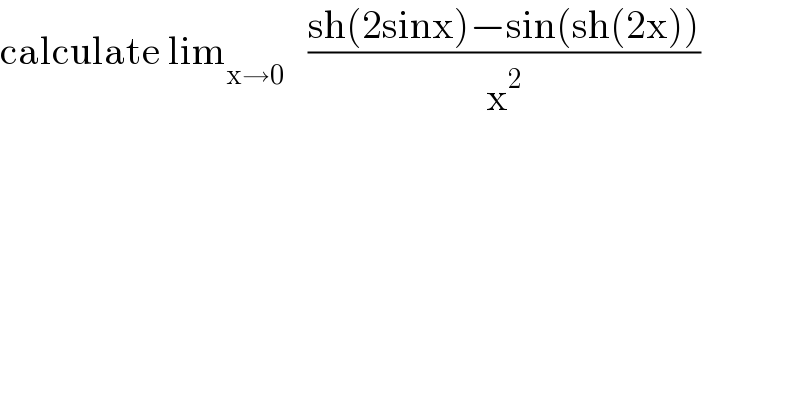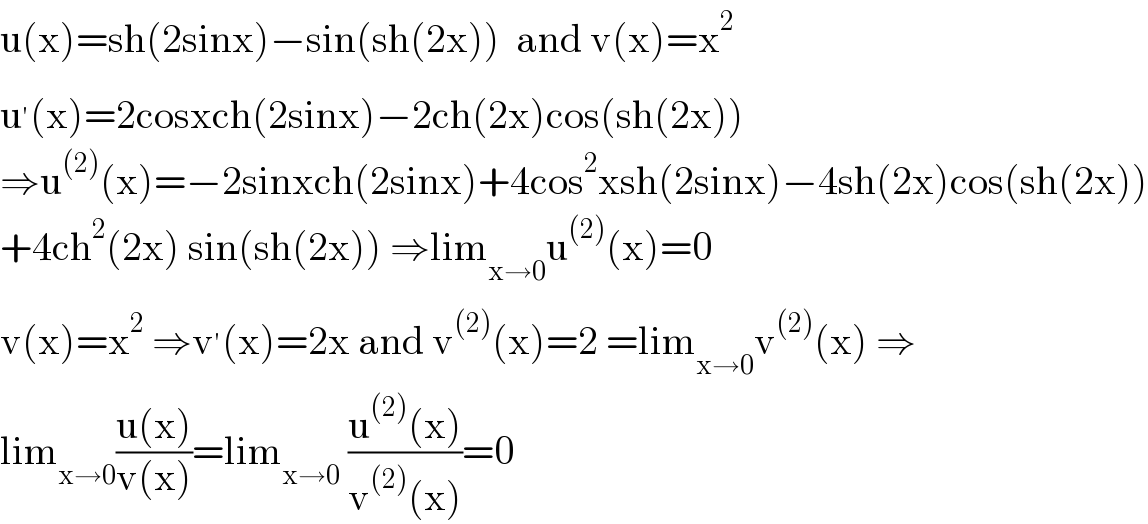
Previous in Relation and Functions Next in Relation and Functions
Question Number 148568 by mathmax by abdo last updated on 29/Jul/21

$$\mathrm{calculate}\:\mathrm{lim}_{\mathrm{x}\rightarrow\mathrm{0}} \:\:\:\frac{\mathrm{sh}\left(\mathrm{2sinx}\right)−\mathrm{sin}\left(\mathrm{sh}\left(\mathrm{2x}\right)\right)}{\mathrm{x}^{\mathrm{2}} } \\ $$
Answered by Ar Brandon last updated on 29/Jul/21

$$\mathscr{L}=\underset{{x}\rightarrow\mathrm{0}} {\mathrm{lim}}\frac{\mathrm{sh}\left(\mathrm{2sin}{x}\right)−\mathrm{sin}\left(\mathrm{sh}\left(\mathrm{2}{x}\right)\right)}{{x}^{\mathrm{2}} } \\ $$$$\:\:\:\:\:=\underset{{x}\rightarrow\mathrm{0}} {\mathrm{lim}}\frac{\mathrm{2sin}{x}−\mathrm{sh2}{x}}{{x}^{\mathrm{2}} }=\underset{{x}\rightarrow\mathrm{0}} {\mathrm{lim}}\frac{\mathrm{2}{x}−\mathrm{2}{x}}{{x}^{\mathrm{2}} }=\mathrm{0} \\ $$
Answered by mathmax by abdo last updated on 29/Jul/21

$$\mathrm{u}\left(\mathrm{x}\right)=\mathrm{sh}\left(\mathrm{2sinx}\right)−\mathrm{sin}\left(\mathrm{sh}\left(\mathrm{2x}\right)\right)\:\:\mathrm{and}\:\mathrm{v}\left(\mathrm{x}\right)=\mathrm{x}^{\mathrm{2}} \\ $$$$\mathrm{u}^{'} \left(\mathrm{x}\right)=\mathrm{2cosxch}\left(\mathrm{2sinx}\right)−\mathrm{2ch}\left(\mathrm{2x}\right)\mathrm{cos}\left(\mathrm{sh}\left(\mathrm{2x}\right)\right) \\ $$$$\Rightarrow\mathrm{u}^{\left(\mathrm{2}\right)} \left(\mathrm{x}\right)=−\mathrm{2sinxch}\left(\mathrm{2sinx}\right)+\mathrm{4cos}^{\mathrm{2}} \mathrm{xsh}\left(\mathrm{2sinx}\right)−\mathrm{4sh}\left(\mathrm{2x}\right)\mathrm{cos}\left(\mathrm{sh}\left(\mathrm{2x}\right)\right) \\ $$$$+\mathrm{4ch}^{\mathrm{2}} \left(\mathrm{2x}\right)\:\mathrm{sin}\left(\mathrm{sh}\left(\mathrm{2x}\right)\right)\:\Rightarrow\mathrm{lim}_{\mathrm{x}\rightarrow\mathrm{0}} \mathrm{u}^{\left(\mathrm{2}\right)} \left(\mathrm{x}\right)=\mathrm{0} \\ $$$$\mathrm{v}\left(\mathrm{x}\right)=\mathrm{x}^{\mathrm{2}} \:\Rightarrow\mathrm{v}^{'} \left(\mathrm{x}\right)=\mathrm{2x}\:\mathrm{and}\:\mathrm{v}^{\left(\mathrm{2}\right)} \left(\mathrm{x}\right)=\mathrm{2}\:=\mathrm{lim}_{\mathrm{x}\rightarrow\mathrm{0}} \mathrm{v}^{\left(\mathrm{2}\right)} \left(\mathrm{x}\right)\:\Rightarrow \\ $$$$\mathrm{lim}_{\mathrm{x}\rightarrow\mathrm{0}} \frac{\mathrm{u}\left(\mathrm{x}\right)}{\mathrm{v}\left(\mathrm{x}\right)}=\mathrm{lim}_{\mathrm{x}\rightarrow\mathrm{0}} \:\frac{\mathrm{u}^{\left(\mathrm{2}\right)} \left(\mathrm{x}\right)}{\mathrm{v}^{\left(\mathrm{2}\right)} \left(\mathrm{x}\right)}=\mathrm{0} \\ $$
